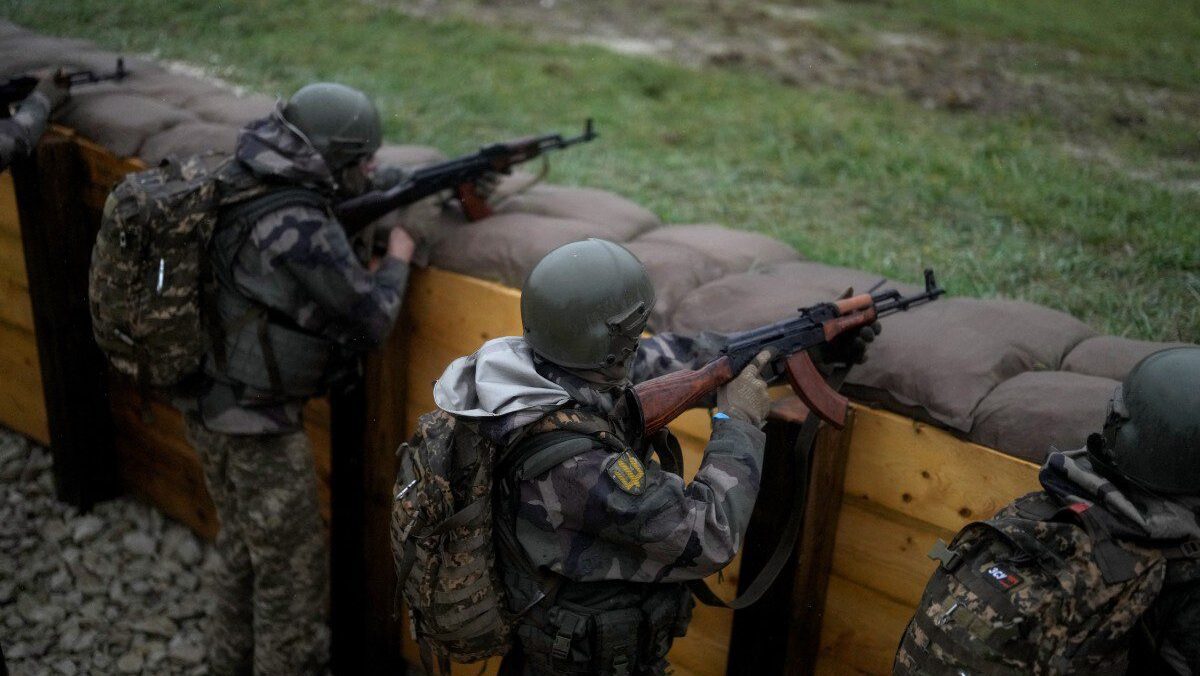
Ukrainian soldiers train in a military camp, as French President is to meet for the first time with Ukrainian troops that France has trained for the country’s fight against the Russian invasion, in eastern France on October 9, 2024.
Photo: Thibault Camus / POOL / AFP
European Union member states have approved a €35 billion loan for Ukraine, to be financed by frozen Russian central bank assets. The money is part of the bloc’s share of a larger planned loan from the Group of Seven nations (G7)—Canada, France, Germany, Italy, Japan, the United Kingdom, and the United States.
‼️At today’s Coreper, Ambassadors agreed to use written procedure for the adoption of the following legal acts on the use of extraordinary revenues stemming from Russia’s immobilised assets to service and repay loans. The written procedure will start once the @Europarl_EN adopted… pic.twitter.com/HS0s7srHTr
— Hungarian Presidency of the Council of the EU 2024 (@HU24EU) October 9, 2024
The G7 agreed to new war funding for Ukraine at its summit in Italy in June. It declared it will lend $50 billion, with the loan interest paid for from Russian assets seized following the country’s invasion of its neighbour in February 2022.
Assets worth around $325 billion (€304 billion) have been frozen by the G7, the European Union, and the European Central Bank since 2022, generating about $3 billion a year in interest. Under the plan, that money will be used to pay off the annual interest on the $50 billion loan to the Ukrainian government.
EU Commission chief Ursula von der Leyen previously said that the loan was for Ukraine to “keep warm” ahead of a third winter of war with Russia. “The European Union is here to help you in this challenge to keep the lights on, to keep your people warm and keep your economy going as you fight for your survival,” she said.
Despite European news agencies reporting that Hungary was going to block the loan to Ukraine, Hungarian Finance Minister Mihály Varga rejected the claims as “fake news.” However, Hungary does intend to wait until after the U.S. presidential election on November 5th to decide whether the EU should renew the restrictions on the Russian frozen assets every six months or every three years.
Currently, all of the EU’s sanctions on Moscow must be renewed every six months via a unanimous EU vote, but the EU Commission has proposed to extend the renewal period concerning frozen assets to three years.
Extending the renewal period is in the interests of the Democrat-led U.S. administration which fears that one single EU country could, at any given time, block the renewal of sanctions, unfreeze the assets, and throw the entire project into disarray. The U.S. is expected to put more money on the table if the renewal period is extended to three years.
Hungary, with its pro-peace stance, has blocked measures that aim to assist Ukraine militarily, as it argues that a diplomatic solution is needed to bring an end to the war, not further military help which only adds fuel to the conflict. Former U.S. President and current Republican presidential candidate Donald Trump is on the same page as Hungary and has vowed to end the war as soon as possible if he enters the White House.
“We need to see where the future U.S. administration is going on this issue. Looking at the presidential campaign, it is obvious that there are two completely different ways of solving the problem. One is headed towards peace. The other continues in the direction of war,” Mihály Varga said, explaining his government’s stance on waiting out the results of the U.S. elections.
Regarding military assistance, the meeting of the Ukraine Defense Contact Group, a loose alliance of more than fifty countries, also known as the Ramstein Format, that coordinates the ongoing donation of military aid to Ukraine, has been cancelled. The high-level meeting in Germany was to take place this weekend, but U.S. President Joe Biden scrapped his trip to handle preparations for Hurricane Milton which is wreaking havoc in the state of Florida.
Ukraine’s President Volodymyr Zelensky had been underscoring for weeks the importance of the Ramstein meeting for Ukraine and the future course of the war. Russian troops have been slowly advancing and occupying Ukrainian territory. Zelensky wants more weapons from his Western allies and the approval to use their long-range missiles deep within Russian territory.
I met with Prime Minister of the United Kingdom @Keir_Starmer and @SecGenNATO Mark Rutte.
— Volodymyr Zelenskyy / Володимир Зеленський (@ZelenskyyUa) October 10, 2024
The key topics of our discussions were Euro-Atlantic integration and the military reinforcement of Ukraine. These are the steps that will create the best conditions for restoring a just… pic.twitter.com/MISQY6qSZT
After the cancellation of the Ramstein summit, Zelensky headed to London to meet British Prime Minister Keir Starmer and NATO Secretary-General Mark Rutte on Thursday, October 10th. The United Kingdom has been one of Ukraine’s staunchest supporters. Rutte, who last week said that Kyiv’s right to self-defence “does not end at the border,” said the parties discussed the use of British-supplied missiles on Russian territory. There is support in London for lifting the restrictions on the use of the Storm Shadow missiles but the government does not want to act alone.
Russian President Vladimir Putin has made it clear he would consider the move an escalation. Putin recently announced a revision to Moscow’s nuclear doctrine, according to which, Kyiv firing Western missiles or other conventional weapons en masse into Russia would be regarded as a joint attack by nuclear powers on the country, and authorise the Kremlin to use its nuclear arsenal at will.
Following his meeting in London, Zelensky will hold negotiations with the leaders of France, Italy, and Germany.
